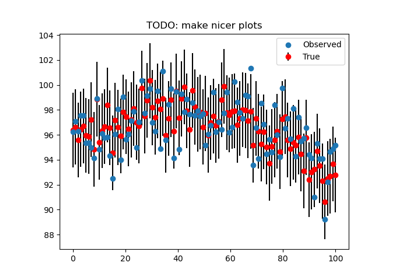NormodMetaregLS#
- class sknormod.metareg.NormodMetaregLS(fit_scale=False)#
Methods
fit(X, y[, X_scale, y_se])Get metadata routing of this object.
get_params([deep])Get parameters for this estimator.
predict_distr_p(X, p)Predict the percentiles of the distribution.
predict_distr_params(X)score(X, y)Compute the logarithmic score of the predicted distribution parameters against the true values.
set_fit_request(*[, X_scale, y_se])Request metadata passed to the
fitmethod.set_params(**params)Set the parameters of this estimator.
transform_to_p(X, y)Transform the target values to percentiles.
transform_to_z(X, y)Transform the target values to z-scores.
- get_metadata_routing()#
Get metadata routing of this object.
Please check User Guide on how the routing mechanism works.
- Returns:
- routingMetadataRequest
A
MetadataRequestencapsulating routing information.
- get_params(deep=True)#
Get parameters for this estimator.
- Parameters:
- deepbool, default=True
If True, will return the parameters for this estimator and contained subobjects that are estimators.
- Returns:
- paramsdict
Parameter names mapped to their values.
- predict_distr_p(X, p)#
Predict the percentiles of the distribution.
- Parameters:
- Xarray-like or sparse matrix of shape (n_samples, n_features)
The input samples.
- parray-like of shape (n_percentiles,)
The percentiles to predict.
- Returns:
- percentileslist of floats
The predicted percentiles.
- score(X, y)#
Compute the logarithmic score of the predicted distribution parameters against the true values.
- set_fit_request(*, X_scale: bool | None | str = '$UNCHANGED$', y_se: bool | None | str = '$UNCHANGED$') NormodMetaregLS#
Request metadata passed to the
fitmethod.Note that this method is only relevant if
enable_metadata_routing=True(seesklearn.set_config()). Please see User Guide on how the routing mechanism works.The options for each parameter are:
True: metadata is requested, and passed tofitif provided. The request is ignored if metadata is not provided.False: metadata is not requested and the meta-estimator will not pass it tofit.None: metadata is not requested, and the meta-estimator will raise an error if the user provides it.str: metadata should be passed to the meta-estimator with this given alias instead of the original name.
The default (
sklearn.utils.metadata_routing.UNCHANGED) retains the existing request. This allows you to change the request for some parameters and not others.New in version 1.3.
Note
This method is only relevant if this estimator is used as a sub-estimator of a meta-estimator, e.g. used inside a
Pipeline. Otherwise it has no effect.- Parameters:
- X_scalestr, True, False, or None, default=sklearn.utils.metadata_routing.UNCHANGED
Metadata routing for
X_scaleparameter infit.- y_sestr, True, False, or None, default=sklearn.utils.metadata_routing.UNCHANGED
Metadata routing for
y_separameter infit.
- Returns:
- selfobject
The updated object.
- set_params(**params)#
Set the parameters of this estimator.
The method works on simple estimators as well as on nested objects (such as
Pipeline). The latter have parameters of the form<component>__<parameter>so that it’s possible to update each component of a nested object.- Parameters:
- **paramsdict
Estimator parameters.
- Returns:
- selfestimator instance
Estimator instance.
- transform_to_p(X, y)#
Transform the target values to percentiles.
- transform_to_z(X, y)#
Transform the target values to z-scores.
